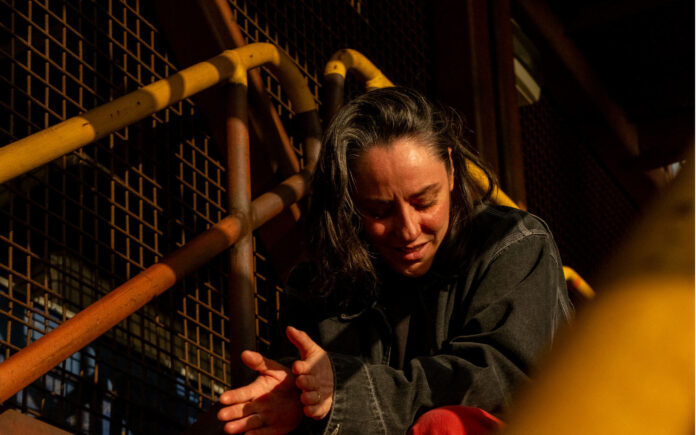For the last time of the year, there’ll be House music all night long at Panorama Bar on Friday: And for that special occasion, Your Love hosts Lakuti and Tama Sumo invited Flo Real and Kléo. Lakuti caught up with the latter for a short interview to learn more about her musical influences and her idea of a perfect party.
You grew up in France and are now based in the Netherlands. How have those two places shaped your musical path if they have at all?
Growing up in the suburbs of Paris as a teenager in the late ’90s, I used to hang out with older friends who introduced me to the club scene. They took me to iconic LGBTQ institutions like Le Queen, where parties such as Respect Is Burning were happening. That’s where I first caught the bug for House music.
Radio also played a huge role in shaping my love for House. Back then, you always knew when to tune in for certain shows, and Radio Nova in the late ’90s was an inspiring platform. Parisian DJs would showcase the House sounds of NYC, and from that moment, there was no turning back—I was hooked.
In 2001, I moved to Amsterdam to pursue an art education, but it wasn’t until approximately 2007 that I became involved in the local music scene. At the time, shops like Rush Hour were already championing the sounds of Detroit and Chicago—Black House, Techno and Disco—the real stuff.
Kindred Spirits was another huge source of inspiration. It was through them that legends like Theo Parrish were first invited to play in Amsterdam, sometimes in intimate settings like the small upstairs room of Paradiso. Hearing DJs like Theo Parrish, Moodymann, and later on Ron Trent play was a revelation—I had never experienced anything like it before.
You are mostly known for playing House music. What is it about House music that captured your heart?
For me, House music has always been more than just a genre—it’s a culture with deeply rooted values that have shaped its identity. These values resonate deeply with me.
House music emerged as a safe haven for marginalized communities, particularly Black, Latino, and LGBTQ+ individuals. It embraces diversity and welcomes people from all walks of life.
In today’s world, where far-right politics are sadly on the rise—especially in Europe, where „divide and conquer“ tactics and strategic manipulation serve the interests of only a few—unifying and loving each other has become an act of resistance. Creating spaces that foster compassion and inclusivity is more important than ever, especially for the younger generation. For me, this is what House stands for.
The spirit of House is about bringing people together and fostering love, respect, and unity. It’s rooted in a sense of belonging and collective experience. Personally, it has always been my emotional comfort zone—a place of joy and liberation.
While honoring its origins in Chicago, as well as the soulful grooves and vocal-driven energy of New York House, both of which have deeply inspired me, the genre continues to evolve. The pioneers laid the foundation for a sound that celebrates its roots but remains open to innovation. Trends come and go, but House is timeless.
What ingredients are needed for you for a party to be good?
A will from the promoter and the venue to create an inclusive dance floor experience. Love in your heart and good music! And, of course, a good sound system.
What inspires you as a DJ and producer and visual artist?
I’ve always needed both music and art to balance each other—between feeling and thinking, intuition and conceptualisation.
I draw much of my inspiration from abstraction in painting, which closely resonates with the kind of abstraction I seek in the electronic music I play. Both are uncompromising, bold, bright, inviting, and relentless. With my hyperactive mind, channeling reality into patterns or meditations has become my way of achieving „chaos control.“ This is where music and art truly intertwine for me.
In both practices—whether music or visual art—my aim has always been to transcend myself, to let go of the ego. It’s about creating an experience where I free myself from myself, if that makes sense, and open up to something communal and universal. Generosity, compassion and kindness inspires me the most in all forms.
You launched your own label Call 4 Rhythm in 2024 with a stomper of an EP titled Agogo, produced by you. Will the label mainly focus on your own productions? What is next for the label?
I started the label to create a space where I could fully let go musically and get my freak on, without feeling the need to meet anyone’s expectations. Now, almost two releases in, I’m starting to warm up to the idea that it could also offer that same creative freedom to other artists.
From the beginning, I’ve approached things organically, allowing paths to cross naturally rather than making calculated moves. So, I imagine when the right music comes along, I’ll feel it in my heart and know it’s something I want to amplify through Call 4 Rhythm.
I also wanted to draw from record store culture by prioritising physical releases first. For the first release, we pressed 300 copies—no represses—to give stores an exclusive head start. Next year, we’re planning a digital package with some exclusive remixes at a later date because, ultimately, the music should be accessible to everyone.
There’s something exciting coming up soon: We’re launching our own series of events in Amsterdam under the Call 4 Rhythm banner. The very first one will take place this New Year’s Eve!

Your Love
December 20, 22:00
Panorama Bar
